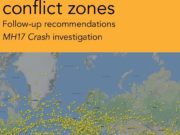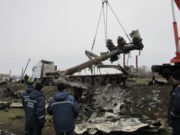FSF Calls for Coordinated Response to Safeguard Commercial Aviation in Conflict Zones
Let’s not let history repeat itself.
Viewing 1 - 9 of 9 results
Let’s not let history repeat itself.
by FSF Communications Staff
News, conflict zones, Risk Management
The European Cockpit Association (ECA), an umbrella organization representing 40,000 pilots across Europe, has called…
by AeroSafety World Editorial Staff

News, Sabotage/Intentional Acts, Flight Planning
In the nearly five years since the downing of Malaysia Airlines Flight 17 by a…
by FSF Editorial Staff

Board following up on MH17-related conflict zone recommendations.
by FSF Editorial Staff
ALEXANDRIA, Va. — Flight Safety Foundation released the following statement on the results of a…
by Flight Safety Foundation
Press Release, 2014 FSF Press Releases
Alexandria, VA, September 9, 2014 – The Flight Safety Foundation released the following statement from…
by Flight Safety Foundation
Press Release, 2014 FSF Press Releases
Montreal, Canada – At the inaugural meeting of the International Civil Aviation Organization’s (ICAO) Task…
by Flight Safety Foundation
Sabotage/Intentional Acts, 2014 FSF Press Releases
Alexandria, VA- In reaction to the joint statement issued today by the International Civil Aviation…
by Flight Safety Foundation
Press Release, 2014 FSF Press Releases
Alexandria, VA – The Flight Safety Foundation today requested today that the International Civil Aviation…
by Flight Safety Foundation
